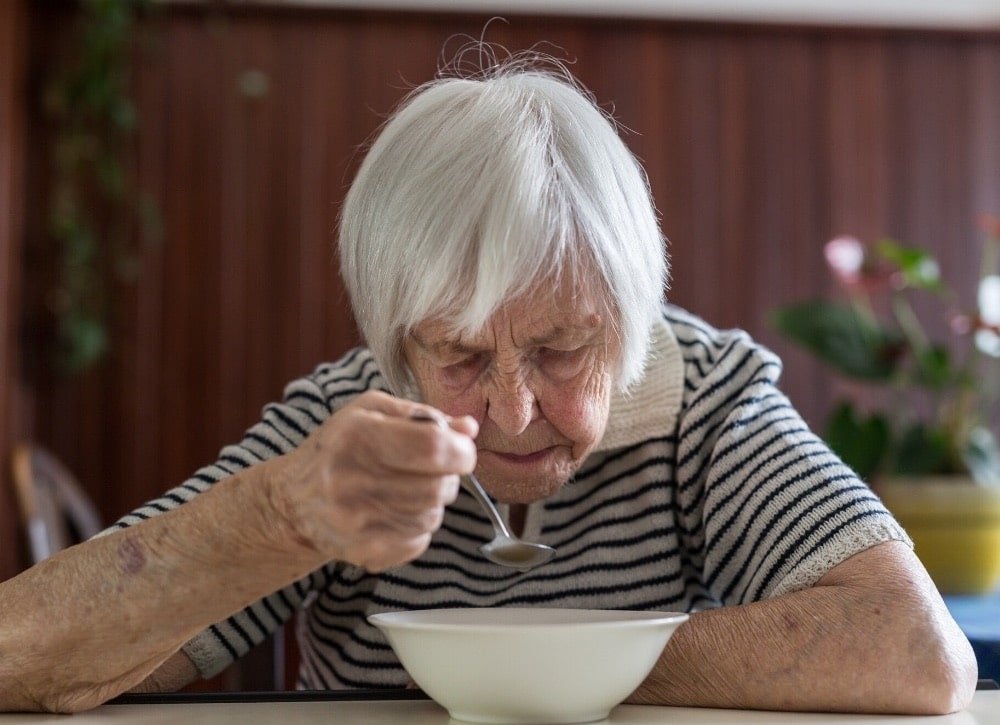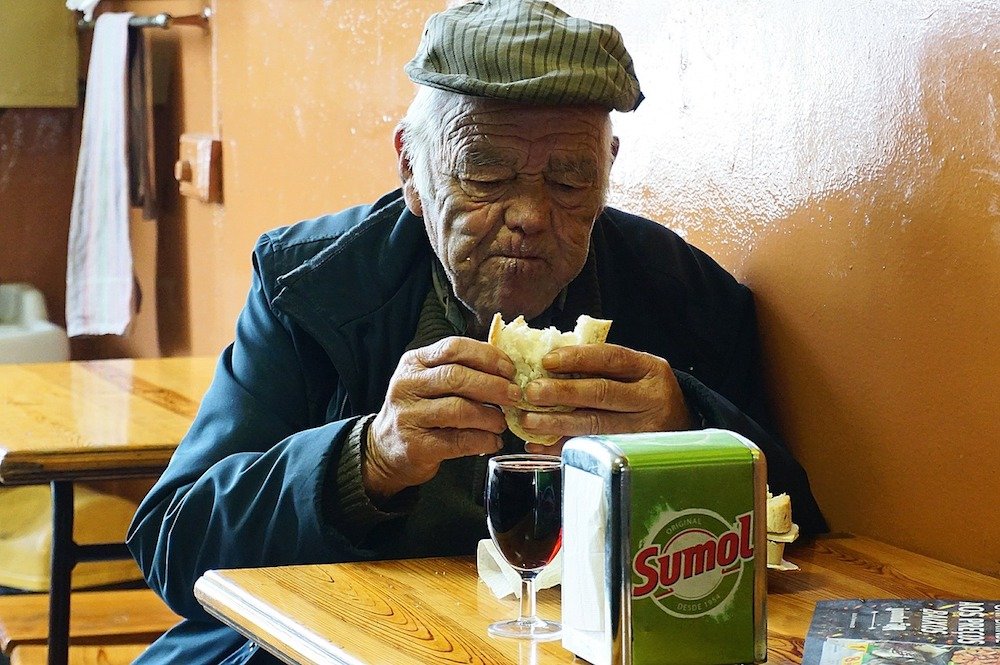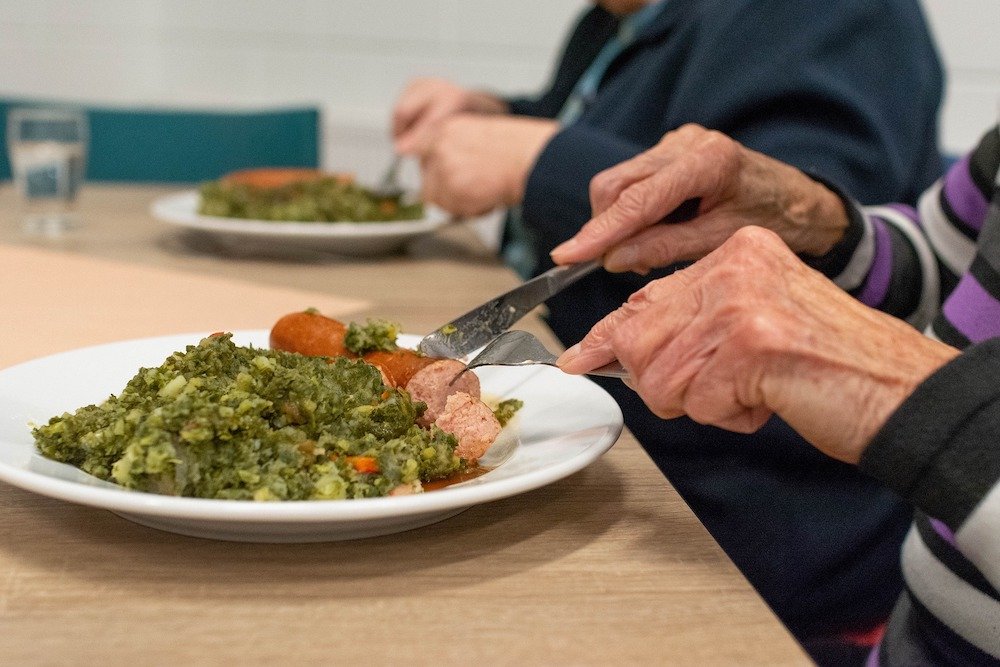A comprehensive answer to the frequently asked question, Why do dementia patients eat so much, is here, written by a doctor and nutritionist.
The differences in appetite between dementia patients vary. Some eat too little, yet others overeat. Some dementia patients may consume too much food in one sitting or eat too many meals in a day.
But why does that occur?
Patients with behavioral variant frontotemporal dementia generally tend to overeat more.
Also, such patients develop a liking for food with a strong smell or taste and tend to eat the same food repeatedly (1).
For instance, very spicy, salty or sugary foods.
It’s also common to observe excessive eating and other related eating behavioral changes in dementia patients as their dietary preferences change.
Some even develop a seemingly inexplicable obsession with certain foods.
Managing Overeating and Dementia
Diagnosed dementia patients will experience a decline in their memory, problem-solving, and other thinking-related skills.
Alzheimer’s disease is the most common type of dementia and patients’ appetites usually change as a result of this.
What Causes A Dementia Patient To Eat More? – Four Possible Factors

Globally the dementia statistics continue to rise. A predicted 75 million people are expected to be diagnosed with the disease by 2030.
One in three elderly people dies from Alzheimer’s or another form of dementia in the US alone.
Dementia affects each aspect of living and poses hurdles that are rather unusual and challenging. Research indicates three of the main reasons dementia patients eat so much include:
1: Diminishing Taste Buds
As people age, their taste buds diminish. As their disease worsens and their taste buds weaken, the insulin levels in their brains can decrease.
Some dementia patients, therefore, experience intense cravings for foods containing high calories. They may prefer heavy or flavor-filled foods such as sugary sweets.
2: Changing Appetite
Also, dementia patients’ appetites change which results in craving unhealthy foods. If a patient overeats, they may eat inappropriate foods. They may even try to consume things that aren’t food, such as a napkin or bar of soap.
This is because they might not recognize the item or understand its use, and therefore they confuse it for food.
3: Forgetting Recent Meals

Due to their declining memory, dementia patients may forget that they’ve recently eaten.
They may frequently ask or search for food. Also, they may be concerned about when their next meal will be. This leads them to eat more.
4: Changes in Mood Might Affect Food and Eating Preferences
It is not uncommon for people with dementia to suffer from co-existing mental health issues, such as depression and anxiety.
One way they find comfort is by eating more or indulging in foods that give them a sense of comfort, which are often sweet and over-indulging (2).
How to Help a Dementia Patient Eat Less?

It can become problematic if a dementia patient eats too much.
It’s important to ensure they’re consuming nutritious food to stay healthy and avoid becoming overweight.
Some patients may refuse help when eating, and they also might not be able to adequately express this.
It’s better not to pressurize a dementia patient to eat or drink when they’re anxious.
Some ways to cater to changing eating habits in dementia patients are as follows:
1. Accept unusual food combinations: Strange mixing of food isn’t likely to cause patient harm, especially if the food is healthy and in appropriate portions. It’s better to acknowledge rather than challenge this.
2. Satisfy sweet cravings for healthier alternatives: If a patient likes sweet foods, try incorporating fruit or naturally sweet vegetables such as carrots or sweet potato into their meals.
How to monitor what patients with dementia eat?
Solutions to monitoring what a dementia patient eats include:
- Cutting food into bite-sized pieces: This assists the patient and makes eating easier, especially if they aren’t able to use utensils by themselves.
- Eating in company: By enjoying a meal together with a loved one, a patient is more likely to eat the healthy meal you’ve served them.
- Fortifying the prefrontal cortex: This controls a patient’s dietary self-restraint. Help by ensuring they avoid alcoholic beverages, sleep sufficiently, and exercise if they’re able to.
- Including plenty of protein: As far as possible, incorporate eggs, milk-based pudding, or protein powder in the patient’s meal.
- Puréeing their vegetables: Patients are more likely to consume softer vegetables.

If a dementia patient is overeating and you’d like to help them to eat less, try the following approaches:
- Generously serve salad and vegetables: Carbohydrates and starch should take up less than half of a plate.
- Halve the original portion: Start by halving the patient’s original portion. Only offer them the second half should the patient request more food.
- Keep them occupied: A patient will feel less bored or lonely if they have something to do and keep busy.
- Offer healthy snacks: Make bite-sized cut pieces of fruit or other healthy nibbles easily accessible.
- Replace a second helping with a drink: Rather than offering the patient more food, give them a “treat” drink such as hot chocolate or a milkshake.
Guidance for Good Nutrition

To ensure a dementia patient is eating correctly, a balanced diet including various foods is key.
Meals should contain fruit, lean protein foods, low-fat dairy products, vegetables, and whole grains.
It is recommended to serve small portions of high saturated fat and cholesterol in a meal.
While some fats are healthy, it’s best to use butter, fatty meat cutes, lard, and solid shortening sparingly.
Also, high-sodium foods should be restricted. Replace salt with herbs or spices instead to flavor meals.
To reduce refined sugars, avoid serving processed foods. Baked goods made with fruit or sweetened with fruit juice are better alternatives.
Honey is also an optional sweetener.
Conclusion
Although some dementia patients tend to overeat, it is possible to better monitor what they consume and how often they do so.
If a patient has a particularly strong preference for foods that aren’t healthy which leads to insufficient consumption of other food groups, it is advised to consult with a dietitian.
Professional assistance with an eating plan will ensure good health with nutritious food and avoid excess weight gain.
::
References:
1. Kyoko Kai, et al. Relationship between Eating Disturbance and Dementia Severity in Patients with Alzheimer’s Disease. PLoS One. 2015; 10(8): e0133666.
2. Chia-Chi Chang, et al. Prevalence and factors associated with food intake difficulties among residents with dementia. PLoS One. 2017; 12(2): e0171770.





























